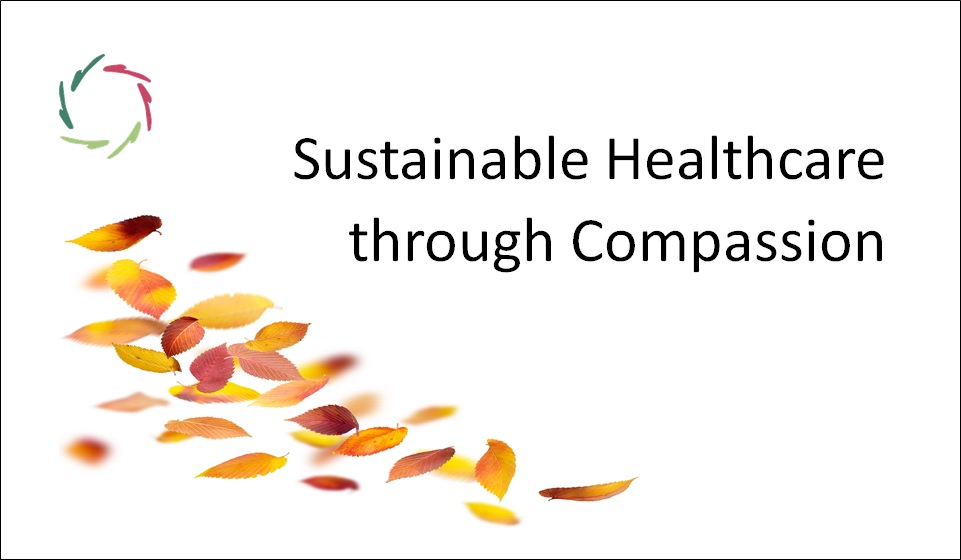Sustainable Healthcare through Compassion

Without Compassion, it is impossible to see the complex connectivity shaping health and illness. This leads more and more to unsustainable healthcare.
Please read [see: “Essence of Compassion“] to get a feel of appropriate un-easiness. That is always a good start towards Compassion.
Horizontal, vertical
This is one way of looking at health and healthcare. The horizontal is where things may be complicated. The vertical is where things are complex. [see: “Complexity of Complexity“]
In bodily matters, the horizontal view is mainly OKAY. With mind at play, the vertical view is more easily needed. There is, in the end, only one ‘human being.’ The horizontal and the vertical are two views upon this being.
Symptomatic medicine
Western medicine has historically been molded from a purely horizontal view. This poses many problems and is getting more and more unsustainable because of these very problems. [see: “Medically Unexplained Syndromes (MUS)“]
Obviously, in the horizontal plane, one can never solve vertical problems. It is principally impossible. The only solutions one can get are cosmetic/symptomatic: taking away the symptom(s), not the cause.
Human depth is needed: going vertical.
This is where Compassion kicks in
Compassion as reaching towards human depth where mind-related issues originate.
A difficulty in understanding how this may work is the fact that the Compassion of the caregiver doesn’t physically touch the patient. How can it have a bodily influence? Hm. Such difficulty stems from horizontal thinking. Indeed, in that way of thinking, it’s impossible.
Compassion of the caregiver elicits Compassion of the client/patient towards himself. It acts as one. It is one happening in complexity, with many threads going back and forth and a result emerging from this happening. In this, the brain acts more or less like a mirror that not only reflects but also changes from inside. Rational but not tractably conceptual.
These changes are how the body can react to Compassion. This is how Compassion can heal. With issues in the vertical domain, it is even the only way a person can sustainably heal: more than symptomatically.
Compassion can be ‘practiced’ on top of care as usual + in the way care-as-usual is brought. This is also important to the caregiver. Burnout of healthcare providers comes (mainly?) through sensing that one is hovering over essential aspects. This must take a toll on sensitive colleagues. They too need Compassion for themselves.
Three directions
Health-related sustainability can be seen in three directions:
- Individually: Sustaining health needs more than getting rid of symptoms.
- At society level: the cost of it all. This is very pragmatic [see: “Saving € 1 trillion in healthcare… mindfully“]
- Spiritually: We may be ‘losing soul’ through lack of Compassion. To me, that is the least sustainable of all. Without soul-contact, there is no meaning, no Inner Strength, no reason to continue as a species.
Oh my, that last one is put quite dramatically.
I do mean it this way.
I still look at evolutions from the positive side, but it won’t happen by itself. There is no magic, only human effort, and willingness.
From silos to one world
To work out a sustainable future, we cannot look at different domains (healthcare, business, education) as separate in the usual way. If we do, we risk superficially solving a problem in some domain while causing one in another field ― and vice versa. We generate a circularity of problems in a horizontal worldview, devoid of verticality, therefore, unreal and unsustainable.
With growing technology, we get more chances to make it even more unsustainable.
A.I. in healthcare?
A.I. is a powerful tool that can be used to stifle Compassion out of healthcare.
But it can also:
- give more time to healthcare providers to bring the Compassionate touch
- show the importance of human depth in mind-health-related issues, thus, the importance of Compassion.
The choice in the direction of A.I. in healthcare is up to us now. With Lisa, I’m doing my best to get something done. [see: “Lisa“]


